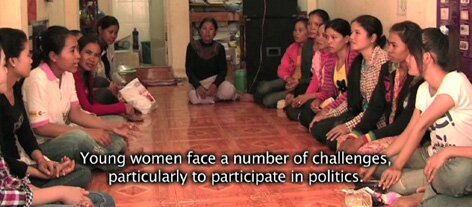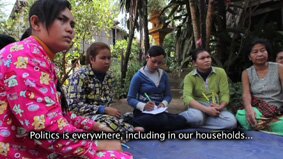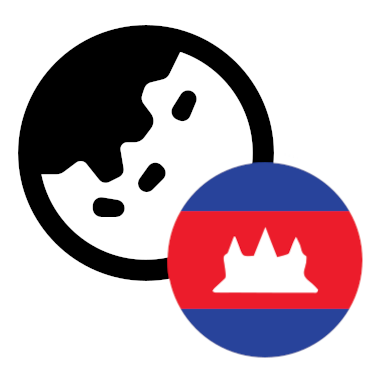
June 2013
Phnom Penh, Cambodia More than thirty percent of Cambodia’s population is between 15-30 years old; half of this young generation consists of women. However, women – and young women in particular – are not yet well represented and actively engaged in political decision-making processes of the country. For example, young women are not represented in the National Assembly and the Senate at all. Eight-teen percent of the commune councillors are women, but women at the age of 25 to 35 hold only 281 out of 11,450 commune council seats – a proportion of 2.5 percent. Of the 1,633 commune council chief positions, only 8 are held by women of this age.
Against the background of this situation, the Committee to Promote Women’s Political Participation (CPWP) has developed a study in cooperation with the GIZ-implemented EU Programme for Strengthening Performance, Accountability and Civic Engagement (SPACE) of Democratic Councils in Cambodia.
Testimonials demonstrate concerns and hopes for political participation
This case study and the accompanying film, “Polishing a Diamond – Young Women’s Political Participation and Representation in Local Governance in Cambodia”, reflects the voices, experiences, and life stories of young women. The young women interviewed are not a representative sample, but they provide strong testimonials illustrating the concerns, issues, inspirations and hopes regarding political participation and representation.
To give a few examples:
“I moved to Phnom Penh and started working in a garment factory almost 11 years ago. I work 10 hours a day, and I earn US$140 a month. I dropped out of school at grade 9. I understand what politics are: I am aware of my power as a voter and my rights as a citizen. I listen to the radio, and I understand what the commune council is about. But, I am absent from my commune and far from my daughter. I need to work and help my family.” (29 year-old factory worker)
“I do not remember anyone ever telling me that I could be a leader […] but I have [all those] voices in my head, talking about my role as a good daughter and wife.” (30 year-old factory worker)
“We have better education compared with our mothers; we work outside the kitchen; we have access to information, the Internet, Facebook, mobile phones, and SMS. We have CYWEN (a membership-based network for young women [100 members]), and we have more decision-making power both in our own family and in our community compared with our mothers.“ (30 year-old CYWEN member)
“I will support and encourage my daughter to consider joining local politics. I am thinking that women are doing a better job than male councilors. After 10 years of having women as council members, I can see their values. They do not waste time and they are practical. Young women would be even better. I will vote for them. Women in the past could only take care of chickens and the kitchen, but now it is different. They can be leaders, and they are doing a good job.” (57 year-old male commune member)
“[…] I am not sure how I can do it [get involved in politics]. Political parties are not providing us with clear information and simple instructions on what the channels are for young people to obtain more information about a party and its platform, policies, and the youth/women’s movement. How can I join them or approach/contact them? What is the requirement to stand as a candidate? I feel also, it would be so strange if you just go to their office and ask for information. I am personally in the dark and do not want to walk in the dark. What I mean is, politics is a dark tunnel for me, and I need some lights before I can join.” (25 year-old university student)
“Cambodian families expect for their sons to attain public status or high positions, and not for their daughters to do this. I am reflecting on my own experience, which my mom often reminds me of, that I should be modest and not aim for a position that may place me at a higher status than my husband. To put it simply – she wants him to shine, not me. This is not an isolated experience, but a common one among those of us with successful professional careers. We talk about it, we laugh about it, and we are working on it to change our families’ perceptions […]” (30 year-old CYWEN member)
“I send home US$70 per month […] My dad passed away in 1997 when I was 16, and since then I have been the breadwinner of the family. I can imagine myself as a commune councilor, but I stop thinking that thought immediately […] We need to eat, pay for rent and medical bills, and […] I think then politics is not for the poor and young women like me who need to support their families. It is simple, we can’t afford it.” (32 year-oldowner of a car repair shop)
“In 2002, who could have even imagined that in 2012, 18 percent of commune council members would be women? This will be the story for young women, too. Cambodia is changing. And change is happening (mostly) at the local level. Cambodia and people in the communes are ready to vote for a 25 year-old single woman. […] Political parties are smart, and that is why they are now recruiting young people in all the villages. Village youth leaders of different political parties are joining and attending their commune council meetings.” (19 year-old CYWEN member)
“I am doing my best to recruit more young people for my party. We now have 12 members (youth, ages 18–25) for each village, and I must admit that they are mostly women. Young men refuse to be group leaders, but young women are interested. Women can bring votes for political parties, and both the CPP and the Sam Rainsy Party (SRP) are aware of this. Women can mobilize people in the village and get lots of support. They talk, and they go door to door to listen to villagers. They are so close to the community.” (50 year-old female commune chief)
Bringing new perspectives into politics
Young women recognize the lack of their interests in politics. Their reasons have to do with politics perceived as irrelevant to their concerns, and their feelings of alienation from an arena dominated by an older generation. This older generation appears to many young women as unapproachable and hierarchical. However, young women also believe in the notion of balancing leadership by including more women and young people. They believe inherently that women will bring new perspectives to solving problems and are interested in what younger candidates might have to offer.
Locating entry points
Through the study and the film, CPWP looks into possibilities, opportunities and entry points for greater engagement in local politics and hopes that this work will serve as a starting point for further discussion and advocacy among relevant stakeholders.
About CPWP
CPWP is a non-profit, non-partisan network of local organizations committed to enhancing women’s political participation and representation in Cambodia, established in 2005. The goals of the CPWP are to promote and advocate for equal access, participation and representation of women and men in political decision-making. The findings of the case study were presented and the accompanying film launched in a Consultation Forum on Young Women’s Leadership in Local Governance with representatives of political parties, relevant ministries, elected commune councilors; youth Networks, women’s rights organizations, relevant local and international non-government organizations and development partners in early 2013.
If you would like to watch the whole documentary “Polishing a Diamond” please visit GIZ Cambodia’s YouTube-Channel!
